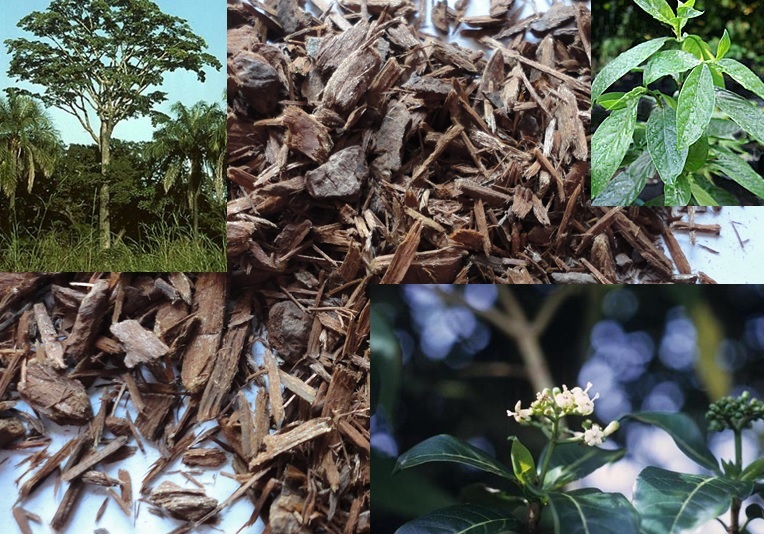Yohimbe (The Herbal Viagra)
Scientific Name(s): Pausinystalia yohimbe
Common Name(s): Aphrodien, Aphrodyne, johimbi, Yocon, yohimbe,
yohimbehe, yohimbine.
The bark of the yohimbe tree is used as a remedy for erectile dysfunction
(ED). Yohimbine has been used
primarily in the treatment of sexual dysfunction, weight (body fat) loss, and
xerostomia (dry mouth).
Yohimbe bark extract should not be confused with
yohimbine hydrochloride as Yohimbine Hydrochloride has been available by
prescription in the U.S. as a treatment for impotence and cannot be used as
evidence for effectiveness of the dietary supplement. Yohimbe contains a
chemical called yohimbine which can increase blood flow and nerve impulses to
the penis or vagina. It also helps counteract the sexual side effects of
certain medications used for depression. Yohimbine refers to the active chemical found not only in yohimbe but also
in Indian snakewood, periwinkle, quebracho, and niando.
The bark of this tree is considered the best natural treatment
for reversing sexual dysfunction but at the cost of several side effects. It is
Called "herbal viagra". Apart from men Yohimbe is also effective in
women. This herb increases blood flow to the genitals of both males and females
giving women an enhanced sensation and engorgement of genital organs. Yohimbine, can improve
sexual problems associated with medications used for depression (Sexual
problems caused by selective-serotonin reuptake inhibitors or SSRIs). In traditional
African medicine system Yohimbe is used to treat Sexual excitement,
Exhaustion, Chest pain, Diabetic complications, Depression. Yohimbe is also used as a muscle building natural version of anabolic
steroids.
Associated Side effacts:
When taken by mouth in typical doses, yohimbe and the
ingredient yohimbine can cause stomach upset, excitation, tremor, sleep
problems, anxiety or agitation, high blood pressure, a racing heartbeat,
dizziness, stomach problems, drooling, sinus pain, irritability, headache,
frequent urination, bloating, rash, nausea, and vomiting.
Taking high doses can also cause other severe problems, including difficulty breathing, paralysis, very low blood pressure, heart problems, and death. After taking a one-day dose of yohimbine, one person reported an allergic reaction involving fever; chills; listlessness; itchy, scaly skin; progressive kidney failure; and symptoms that looked like the auto-immune disease called lupus.
Taking high doses can also cause other severe problems, including difficulty breathing, paralysis, very low blood pressure, heart problems, and death. After taking a one-day dose of yohimbine, one person reported an allergic reaction involving fever; chills; listlessness; itchy, scaly skin; progressive kidney failure; and symptoms that looked like the auto-immune disease called lupus.
Special precautions & warnings:
Pregnancy or breast-feeding, Schizophrenia, Prostate problems,, Post-traumatic stress disorder (PTSD), Liver disease, Kidney disease, High blood pressure or low blood pressure, Chest pain or heart disease, Anxiety, Depression, Diabetes.
Do not take this combination
Medications for depression (MAOIs), Clonidine (Catapres),
Guanabenz (Wytensin), Medications for depression (Tricyclic antidepressants), Medications
for high blood pressure (Antihypertensive drugs), Naloxone (Narcan), Phenothiazines,
Stimulant drugs.
Caffeine-containing herbs and supplements, Ephedra, Foods
that can narrow the blood vessels, Foods that contain tyramine.
Adverse Reactions:
Clinical trials report few serious adverse reactions. There are case reports
of rash, lupus-like syndrome, bronchospasm, severe hypotension, dysrhythmia,
heart failure, and death. Increased anxiety, irritability, and excitability
have also been reported. Animal studies suggest yohimbine may increase motor
activity and seizures at higher dosages. Yohimbe may precipitate psychoses in
predisposed individuals. One should not use yohimbe
if you have kidney, liver, heart, or psychiatric problems. Yohimbe products may
interact with other supplements or medications you may be talking. Adverse Reactions:
Cautions:
This drug should not be used in the presence of renal or hepatic function impairment.
Do not use during pregnancy or lactation.
It is strongly recommended to
keep the dose low to prevent the yohimbe side effects and consult with your
doctor/expert before administration.
